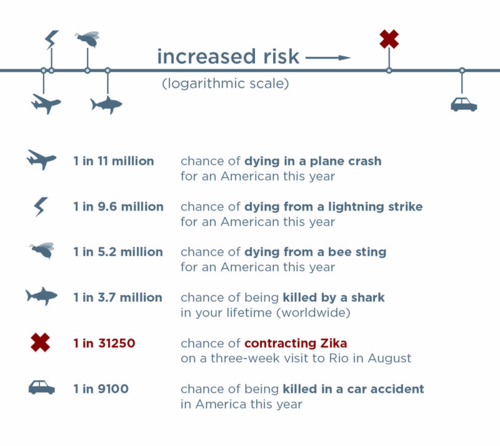Zika, the Olympics and Risk Management
Written by Anthony Demangone
We've all read probably more than we want to about Zika and mosquitoes. Â
Like any new epidemic, Zika can cause fear. Much of that is due to the unknown. Am I at risk? What can I do to protect myself?
For me, this came to a head when a group of 200 scientists signed a letter urging the Brazil Summer Olympics to be postponed or moved to a new location. Their reasoning seemed sound. We have an epidemic - much of it seeming to originate in South America. And we're going to invite the world in for three weeks and then have them go back to their home countries and spread the virus.
That caught my attention. Right or wrong, I put faith in people far more intelligent than I. And if 200 signed a letter? Hmmm.
Fast forward to the present. As I was driving into work, NPR did a wonderful job of discussing the true risk of the Zika epidemic, as it related to the Olympics.
It seems the 200 scientists failed to consider (or chose not to discuss) two major variables.
- Just how many mosquitoes would bite visitors during the time-frame of the Olympics? And how many would contract Zika?
- How big are the Olympics in the grand scheme of things related to traffic in and out of Brazil? Would cancelling them make any difference?
An epidemiologist attacked the first issue, using a mathematical model using data from another outbreak in Rio to estimate the chance that visitors to the Olympics would get a mosquito bite. What he found is that there is very little mosquito activity in August in Rio - during its winter. In fact, he estimates that only 4 percent of fans would get bitten by a mosquito carrying Zika. And the chance of cases? Far lower than that.Â
At most, a total of 16 additional cases.Â
In addition, the Olympics account for less than 0.25 percent of travel to Brazil. So, in other words, cancelling the Olympics would still leave 99.75 of the risk on the table.Â
After hearing the report, I didn't give a sigh of relief. But it also put things in perspective. Â As did this chart that NPR produced. Â
So, the bottom line is this: Yes, there is increased "Zika" risk in with the Olympics in Brazil. But once you measure that risk, you have a much easier time making decisions based on your risk appetite.Â
***
Speaking of Risk, the early bird deadline for NAFCU's Risk Management Seminar is this Friday. It takes place this August 8-10 in Denver, Colorado. You'll save $100 by registering by the deadline. We hope to see you there!

